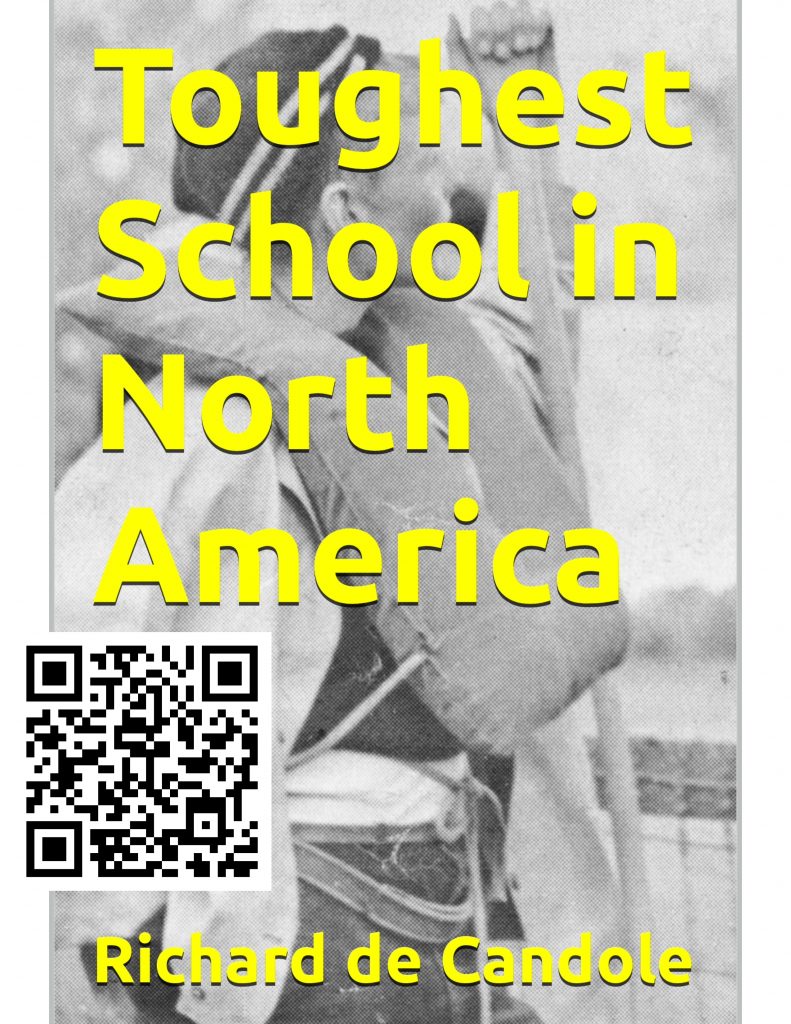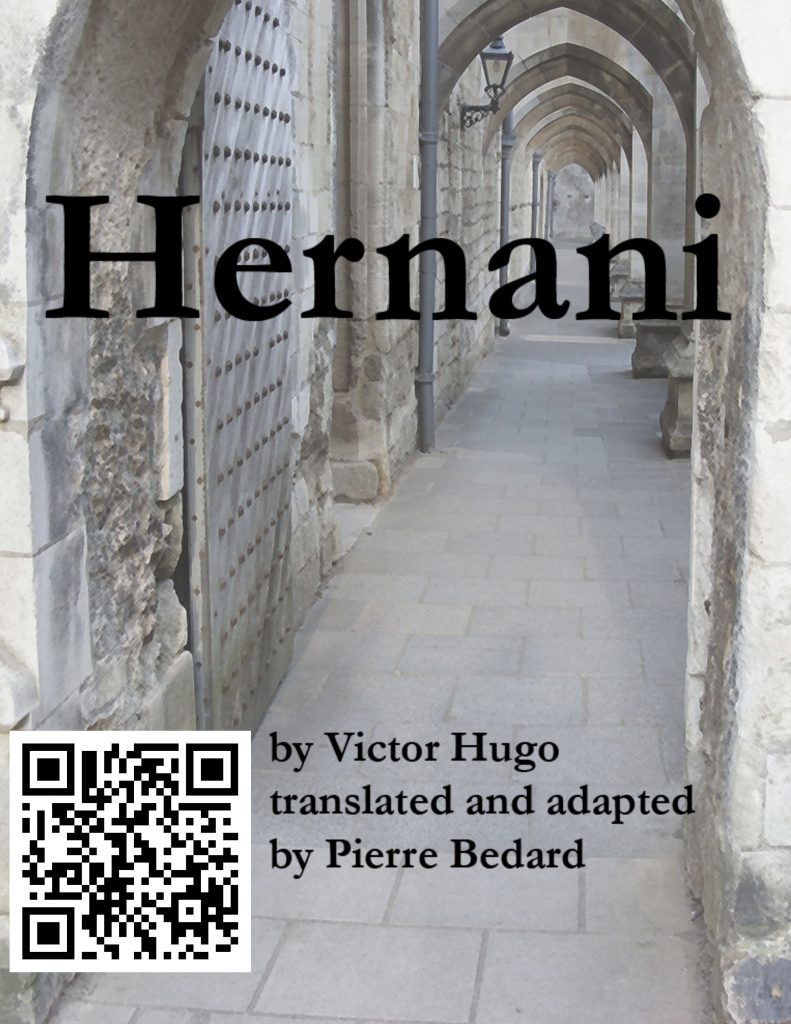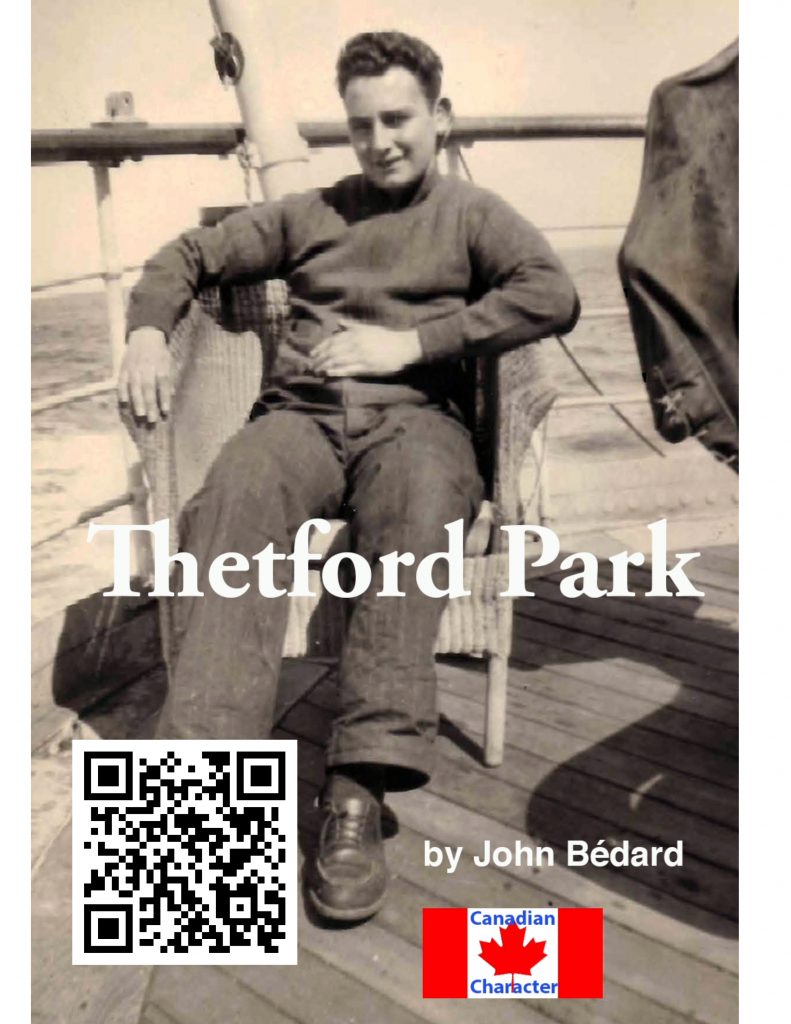
“What the fuck do you think you’re doing,” bellowed Forfar from the back seat. “You trying to get us caught?”
“We were going the wrong way. We want the Provencher bridge, not the Norwood,” Stephens replied with a silly smirk as he spun the steering wheel then put his foot to the floor.
His solution had been to do a Uey on the bridge and head the school’s Chevy II back up Main St. It was two in the morning and the streets of Winnipeg were deserted. Or so it seemed. They hadn’t gone two blocks before Stephens caught sight in the rear-view mirror of a dark-colored car that was racing to catch up to them.
“I hate to say this guys but I think we’ve got a cop on our tail,” reported Stephens. “Should I try and ditch him?” he asked playfully.
“Don’t be an asshole,” his three passengers shouted angrily, irritated to have put their fate in his hands.
“Just play dumb. That shouldn’t be too hard for you,” said Baptiste. “Just don’t let him find out the car’s stolen or we’re in deep shit.”
“Okay, how about I tell him we were in town doing chicken sales,” suggested Stephens.
“In the middle of the night?” sneered Raymes. “Cops aren’t that gullible.”
“I’ll think of something,” he assured.
“Don’t say anything stupid, Stephens. You fuck up, you die,” reminded Baptiste as he administered a skull-cracking knout to the back of his head.
Any doubt about the car pursuing them vanished when it pulled up behind and activated the red light on its dash. They had been nailed by an unmarked police cruiser. Stephens pulled over, turned the engine off, and began puffing bravely on a cigarette.
“Can I see your driver’s license and vehicle registration, please?” the officer said in an unmistakable St. Boniface French accent.
“Are you Craig Stephens?”
“That’s what my friends call me.”
“This is a learner’s permit. Does someone in the car have a license?”
“Here,” grunted Raymes, handing over the license he and Stephens had obtained from Cooper before leaving the dorm.
“Why are you driving a vehicle registered to St. John’s Cathedral Boys’ School?”
“Well, we’re students there. I don’t know how much you know about the school but every Wednesday night during the fall we come into the city to do telephone sales for free. It’s a modern form of slavery.
“We sell chickens raised in the school barn. They’re the large roasting kind and they sell for $.69 per pound. The school is divided into sales teams. Using names and numbers from the Henderson’s directory we phone people in a certain area and ask if they’d like to buy…”
“In the middle of the night?” interrupted the officer impatiently.
“We were phoning supporters in Alberta,” replied Stephens straight-faced. “It’s not as late there. As a reward for being the top sales team we got to go to the Sals.”
The cop didn’t look convinced. For a moment the other three allowed themselves to hope they might get off with a warning until Stephens came up with the Alberta bit.
“What about the U-turn in the middle of the bridge?”
“That’s easy to explain. I have this bad habit of getting directions mixed up. I realized I was going south instead of north back to the school so I pulled a Uey. I guess it was just my bad luck you happened to be in the area.
“If what you say is true you’ve got no worries,” said the officer, “but we’re going to have to take you in for more questioning. Wait here while I arrange to have your car driven back to the station.”
As they sat waiting they wondered whether they hadn’t tempted fate once too often. It was a miracle they hadn’t been caught on previous unauthorized outings. It was, even more, a miracle there hadn’t been an accident since most of the students involved didn’t have drivers’ licenses.
There is, of course, no official record of the first middle-of-the-night adventure off the property. Most of the incidents involved smokers walking into Selkirk to replenish their supply of cigarettes. In good weather, particularly in spring, the outings were more of a lark. On at least one occasion half a dozen students took a canoe and paddled into Selkirk. The Wiens kids’ bicycles are also known to have been used.
It was inevitable that at some point their attentions would turn to the vehicles on the property. Father Sargeant’s Chevy II became the favorite because it was easy to push, and it didn’t have the identifying school crest on the door.
One night early in October, several classmates in Grade 11 were on the prowl when suddenly the Chevy II roared up to the front door and stopped. Mr. Bennett got out and went inside. Seconds later the light in the chapel turned on. Through the window, they could see Mr. Bennett drop to his knees in prayer. They remembered he had been at the hospital that day awaiting the birth of his first child. They guessed he was now giving thanks for a safe delivery. A year earlier he had married my sister Clare at St. Peter’s stone church.
Soon he got up, turned off the light, and came back out the front door. From there he made his way across the lawn to his house beyond the Wiens’s. His observers next turned their attention to the Chevy II. They immediately realized the key was still in the ignition. It was an opportunity they couldn’t turn their back on.
Quietly the car was pushed out the driveway and down to the Father Turney Road where they jumped in and were gone. It was the first of numerous nighttime joy rides in the Chevy II. Each time they went out the participants got bolder. By late October there was only one challenge left – Winnipeg.
If they had just gone to the Salisbury House in North Winnipeg they probably would not have been stopped. Assuming, that is, that Stephens didn’t try to make a U-turn somewhere else. While they waited for the cop to return from his cruiser various strategies were discussed including the possibility of Stephens taking the rap. Forfar argued their only hope for getting off was to tell him it was nothing more than a harmless schoolboy prank.
During the drive to the St. Boniface station, the officer seemed sympathetic, even amused by what he was hearing, but he didn’t let on what their fate might be. At the station, they were taken one at a time into a room for questioning.
The officer basically wanted to hear their side of the story and wasn’t trying to trip them up. Baptiste even remembers him being curious why he was wearing his black turtleneck sweater inside out. He said that with the school crest and yellow trim hidden it made him feel less conspicuous.
Afterwards, the request that they provide a written statement seemed like nothing more than a formality. The statements were taken with everyone sitting together. A feeling of almost cocky self-confidence had returned.
The statements became more and more detailed, much to the annoyance of the officer doing the typing. He was comfortable neither understanding English nor typing it. As soon as Stephens began everyone realized it was a big mistake to let him go last.
“The time was 11:35 on the evening of Wednesday, October 26 when my partner in crime, Daniel Francis Raymes, gave the agreed-upon signal for departure. Silently we rose from our beds, got dressed, listened for signs the duty master was still on patrol, then tiptoed down the hall and out into the chilly autumn night…”
Thus began Stephen’s four-page reconstruction of the events that led to the incident on the Norwood Bridge. No detail was left unmentioned. He recalled how they had recruited Forfar and Baptiste when they discovered they couldn’t push the Chevy II by themselves. He provided a mile by mile description of the route they took and he even gave a critique of his meal at the Salisbury House.
The cop would clearly have preferred otherwise but he had no choice but to hear Stephens out. On those occasions when the cop had trouble understanding his English Stephens would obligingly provide a French translation. Mr. Byfield would have been proud of his performance were it not so misplaced. His conduct at the St. Boniface police station was just plain obnoxious. The other three soon realized he had killed any chance of not spending the night in jail. And they were furious. But Stephens wasn’t finished. He still had to re-read the account and put his signature to it.
“Can I have a pencil, please?” he asked as he sat down at a desk to begin the task. The officer soon regretted granting his request. Stephens was marking the document like it was a history essay. Beside one line appeared the letters ‘Sp.’ Besides the next an ‘ROS.’ And beside another – ‘FLO.’
“What do you think you’re doing?” said the officer sharply.
“Just indicating the mistakes,” he replied with a little chuckle. “You’ve made a spelling error here. This is a run-on sentence and a fact has been left out here so I wrote FLO.”
The cop became very angry.
“Just read it and sign it,” he spat grabbing Stephens by the scruff of the neck then gradually easing him back into his chair.
“Maybe a night in the cells will take that smirk off your face.”
Thus did the four night riders learn of their fate. Moments later they were marched into the cell block, relieved of their valuables, and locked behind bars. Because he was over 18 Baptiste was put in the drunk tank. The other three had a cell together. Curiously, their spirits were anything but subdued.
They had not been formally charged so they assumed they were just being held overnight until the school could be notified. Wisecracks came one after another.
As the guard clanged the door shut one of them joked about him not taking their shoelaces. Later they made a game out of pretending to race the flea-infested pillows across the floor. Stephens had been allowed to keep the dice and lucky rabbit’s foot he wore around his neck. The former provided some gambling diversion, while the latter with its metal end gave them something to scratch their initials on the wall with.
The next morning the first thing Cooper realized was that his dorm mates were missing. His first thought was that they had gotten back so late they had gone to the classroom and were pretending to study.
When he discovered they weren’t in the classroom he realized he would have to try and cover for their absence. During the dorm inspection, his explanation that he thought they might be studying drew no response from the duty master. It wasn’t until after breakfast when Mr. Wiens called him into the office that Cooper suspected something serious had happened.
Mr. Wiens wanted an explanation as to why his driver’s license had been presented to the police in Winnipeg the previous night. Cooper admitted he gave Stephens his wallet but maintained Stephens said he wanted it to borrow some money. Mr. Wiens didn’t press the point, nor did he reveal what had happened to his four classmates.
Throughout the morning the four detainees waited for their release but none came. At lunch, they were brought sandwiches and pop from a nearby restaurant. They tried to pump the guard for information to no avail. They figured either the school was making them sweat a bit or worse, the decision had been made to lay charges which meant the matter had to go before a judge for a bail hearing.
An hour or so later the guard came to their cell, unlocked the door, and called out their names. His manner did not give them any reason to be optimistic.
“Raymes, Daniel Francis.
“Forfar, Donald Glen.
“Stephens, Craig Vaughn. Come with me.”
At the end of the hall, they were joined by Baptiste and were escorted to one of the interview rooms.
“There’s someone here to see you,” said the guard, as he opened the door and motioned for them to go in. Sitting at a table facing them was Mr. Wiens.
“Sit down,” he said calmly but gravely.
“I am very disappointed with all four of you. I’ve never been as ashamed of the conduct of four St. John’s boys. Your actions in the past 24 hours are as inexcusable as they are short-sighted. When senior students such as yourselves disregard the rules in such a brazen manner your actions serve to undermine the moral fabric of the school. It’s an attitude that if allowed to spread would eventually destroy the school.
“I’m not prepared to allow that to happen. I have no choice but to expel you. I’m sorry it had has come to this. I had great hopes for all of you. I have asked that no charges be laid for the theft of the vehicle.
“When we leave here I want each of you to phone your parents and tell them where you are and what has happened. I’ll be phoning them later to explain the decision. You’ll have to find your own way home. Have you anything to say for yourselves?”
No one replied. Raymes and Stephens were both from Winnipeg and could go home immediately, but Forfar and Baptiste first had to scrape up the money for the bus fare home – Forfar to Dauphin, Baptiste to Calgary. Forfar was able to leave later that day. Baptiste left the following day.
A debate raged for several days at the morning staff council meeting as to whether the expulsions should be permanent. Eventually, it was decided they could return if they apologized. Most felt that they should be given a chance to learn from their mistakes.
By the middle of November, all four were back at the school, but as punishment they found themselves in very unenviable circumstances. All had been crew leaders before the incident. Now they worked alongside the junior members of each crew, washing the dishes, feeding the chickens, and scrubbing the floors. Further, they lost all weekend leave until Christmas. It was one instance in which the 10 swats they also received seemed like little more than a rap on the knuckles.
Stephens was never forgiven for his antics and was subjected to a lot of bullying. The last straw was the day all his possessions were dumped in the hall and the mattress removed from his bed. He had had enough and he left. A week later Stephens was back but not until after Mr. Wiens arranged for him to move to another dorm.
Later that year, Raymes got into a heated argument with a junior master over whether he had disobeyed his order. He refused to apologize because he said he hadn’t disobeyed the order and for that, he was permanently expelled. Stephens and Baptiste both quit at the end of the year while Forfar returned to complete Grade 12.
Richard de Candole has been working in British Columbia and Alberta as a reporter and editor for over 40 years. Toughest School in North America is about his five years as a student at St. John’s Cathedral Boys’ School in Selkirk, Manitoba from 1962 to 1968. Richard lives with his wife Wendy in Qualicum Beach, British Columbia.
Buy the book exclusively through Amazon.


